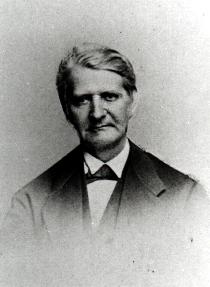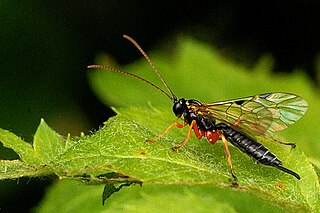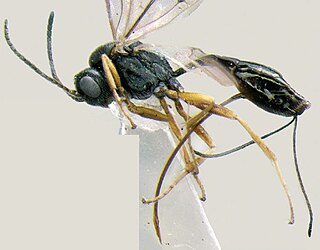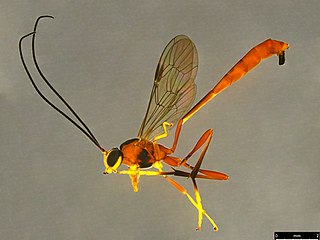
The Ichneumonidae, also known as ichneumon wasps, ichneumonid wasps, ichneumonids, or Darwin wasps, are a family of parasitoid wasps of the insect order Hymenoptera. They are one of the most diverse groups within the Hymenoptera with roughly 25,000 species described as of 2016. However, this likely represents less than a quarter of their true richness as reliable estimates are lacking, along with much of the most basic knowledge about their ecology, distribution, and evolution. It is estimated that there are more species in this family than there are species of birds and mammals combined. Ichneumonid wasps, with very few exceptions, attack the immature stages of holometabolous insects and spiders, eventually killing their hosts. They thus fulfill an important role as regulators of insect populations, both in natural and semi-natural systems, making them promising agents for biological control.

Cryptinae is a subfamily of wasps in the family Ichneumonidae. The family has also been called Gelinae, Hemitelinae, and Phygadeuontinae by various authorities, though the Phygadeuontinae have since been elevated to a separate subfamily.

Arnold Förster was a German entomologist, who worked mainly on Coleoptera and Hymenoptera.

Pimplinae are a worldwide subfamily of the parasitic wasp family Ichneumonidae.

Acaenitinae is a subfamily of the parasitoid wasp family Ichneumonidae. Female Acaenitinae have a large triangular projecting genital plate.

Tersilochinae is a worldwide subfamily of the parasitic wasp family Ichneumonidae.

Allophrys is a genus of the parasitic wasp family Ichneumonidae.

Lusius is a genus of parasitoid wasps in the tribe Phaeogenini Förster, 1869 or Alomyini Förster, 1869, first described by Pierre Jules Tosquinet in 1903, published after his death. The genus is similar in appearance to species in the genus Heterischnus. Lusius occurs in the Oriental, Afrotropical, Neotropical and Australasian biogeographical regions.

Trogus is a genus of parasitoid wasp found in the Holarctic and Neotropic regions. It is placed in the subfamily Ichneumoninae and the tribe Ichneumonini. Trogus species are parasites of larvae and pupae of the swallowtail butterfly family, Papilionidae. The genus consists of twelve extant and one extinct species.

Exetastes is a genus of parasitoid wasps belonging to the family Ichneumonidae.
Itoplectis is a genus of insect belonging to the family Ichneumonidae.
Astiphromma is a genus of parasitoid wasps belonging to the family Ichneumonidae.

Barycnemis is a genus of parasitoid wasps belonging to the family Ichneumonidae. Host species include the genera Byrrhus, Bledius, and Pissodes.
Campoletis is a genus of parasitoid wasps belonging to the family Ichneumonidae.

Habronyx is a genus of parasitoid wasps belonging to the family Ichneumonidae. The species of this genus are found in Europe, Australia, and North and South America.
Sinophorus is a genus of parasitoid wasps belonging to the family Ichneumonidae.
Eriborus is a genus of parasitoid wasps belonging to the family Ichneumonidae.
Protarchus is a genus of parasitoid wasps belonging to the family Ichneumonidae.
Allomacrus is a genus of parasitoid wasps belonging to the family Ichneumonidae.

Callidora is a genus of parasitoid wasps belonging to the family Ichneumonidae and the subfamily Campopleginae. It is relatively species poor, with only five recognized species.












